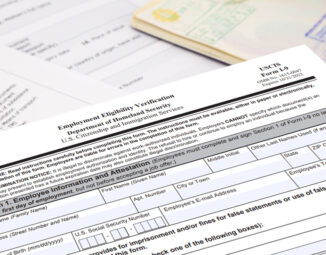U.S. Supreme Court to Decide U.S. Citizens’ Rights When a Consulate Denies a Spousal Visa
The U.S. Supreme Court (SCOTUS) has granted certiorari to hear Department of State v. Muñoz, at the request of the Biden Administration. The stakes are high. It challenges the longstanding “doctrine of consular non-reviewability”—a monolithic judicial principle that shields from review decisions made at U.S. embassies and consulates around the world regarding visa applications and admissibility into the U.S.
Broadly speaking, this doctrine is invoked by the federal government to support a position that they need not provide detailed information regarding visa decisions. Not to the applicants and not even to our courts. It can often be coupled with arguments touching on national security interests and even consular operational efficiency. Anyone who has encountered an issue in consular processing can attest that the Embassy feels like a blackhole of decision-making: An applicant can be subject to one officer’s discretionary authority.
Such is the story of Sandra Muñoz (a U.S. citizen) and her spouse, Luis Acensio Cordero. The couple had been separated for nine years after Mr. Cordero was denied a visa to return to the U.S. without a detailed explanation, having found that the applicant was a member of the gang MS-13 based on evidence it evaluated, including the fact that he had tattoos. “Factual findings” made by a consular officer are notoriously impervious to scrutiny. After hitting a wall, the couple sued, arguing the federal government had violated Muñoz’s constitutional right to marriage and due process by denying her husband’s visa without providing a timely explanation.
Muñoz secured a victory in California’s 9th Circuit Court of Appeals in 2022. Now, the Biden administration seeks to unravel that victory and preserve the “doctrine of consular non-reviewability”. The administration advocates that the 9th Circuit is an island amongst the federal circuits in holding that a U.S. citizen has a protected liberty interest under the Fifth Amendment’s due process clause in a noncitizen spouse’s visa denial. Consequently, they urge the Court to weigh in and set the uniformity that our judicial system seeks out.
SCOTUS has agreed to hear the case on the following questions of law:
- Whether a consular officer’s refusal of a visa to a U.S. citizen’s noncitizen spouse impinges upon a constitutionally protected interest of the citizen; and
- whether, assuming that such a constitutional interest exists, notifying a visa applicant that he was deemed inadmissible under 8 U.S.C. § 1182(a)(3)(A)(ii) suffices to provide any process that is due.
It is a well-settled law that noncitizens who are not physically present within U.S. territory do not have constitutional rights. So, the linkage to the U.S. citizen relative is dispositive. It is also established law that the executive branch has sweeping discretion regarding issues bearing on immigration and foreign relations. On the other hand, our jurisprudence has long and repeatedly upheld the existence of a constitutional right to marry through a series of substantive due process and equal protection cases. The Muñoz case forces the reconciliation of the two sides to see whether a U.S. citizen has actionable derivative rights where their spouse is denied a visa and, therefore, entry into the U.S.
The information contained in this publication should not be construed as legal advice, is not a substitute for legal counsel, and should not be relied on as such. For legal advice or answers to specific questions, please contact one of our attorneys.





